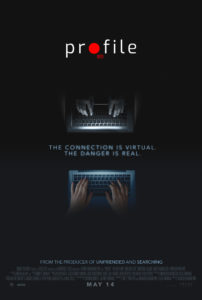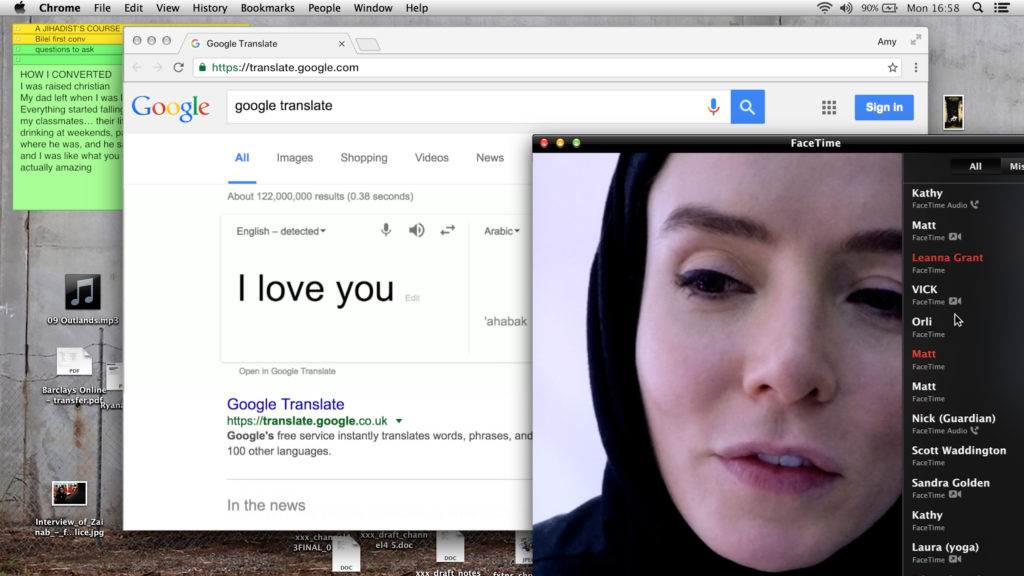Review by David Baldwin

Freelance journalist Amy (Valene Kane) is working against a looming deadline on a story about terrorists recruiting young European woman online. In order to get closer to the story, she creates a fake Facebook profile, posts a few links and almost immediately attracts the attention of terrorist recruiter Abu Bilel (Shazad Latif). The two begin conversing regularly on Skype, and as Amy’s story develops, so too do her feelings for Bilel.
The film is based on a true story and told entirely through a computer screen using Director Timur Bekmambetov’s patented Screenlife format (previously seen in the likes of Searching, Unfriended and if you were lucky enough to catch it at Sundance or SXSW this year, R#J). It lends the story an eerie aura of authenticity and though I find this style of filmmaking fascinating, I know it is not for everyone. So keep that in mind before venturing into Profile, because the action never leaves the computer screen.

All of that said, I found Profile to be thrillingly effective and downright chilling in the story it portrays. It takes virtually no time at all for Amy and Bilel to start talking, and the rest of the film’s running time becomes a game of who is catfishing who that left me on the edge of my seat, practically screaming at the characters. It is easy for me to say their actions are stupid, but it is just as easy for me to see how realistic and human they are as well. You get sucked into this online relationship just as much as Amy does, and the film has a way of making you feel bad for both of them as they lie through their teeth to one another. Latif infuses Bilel with charisma and wit, but the film thankfully never makes you forget that the character is a terrorist recruiter, keeping that knowledge hovering overhead of every minute proceeding his introduction. While Bekmambetov habitually ratchets up the tension by adding multiple elements to the screen at once (mainly in the form of the wartorn battlegrounds Bilel inhabits, as well as other characters IM’ing Amy or listening in as she records her conversations with Bilel), Profile works best when it is just Kane and Latif talking to each other. Neither one really makes their characters any more complex than they need to be, instead just letting their chemistry guide the story where it needs to go.
Whereas Latif’s character has a deliberately one-dimensional façade, I feel like the film suffers from not letting Kane really develop her character. We learn little tidbits that guide our understanding of the headspace she is in when she decides to take on this assignment, and sadly very little else beyond that. Her deeper characterization might not feel important to the story Bekmambetov is trying to tell, but when certain plot points hinge on her relationships with other characters, it starts to feel a whole lot more crucial. One particular “oh shit!” moment is effective enough because you can see it choreographed a mile away (and a bigger audience likely would be gasping in unison when it happens). Once that shock wears off though, it becomes rather meaningless in the grand scheme of things. If Bekmambetov did not treat it as meaningful earlier on, then why bother going for the cheap gag later on?
I enjoyed Profile for the most part. While I wish it went a little deeper (and that the ending was less of a cop out), I do not fault Bekmambetov for keeping the story as simplistic as possible. It really soars when it is just focused on these two people chatting on Skype, allowing it to flip instantly between quiet intimacy to utter terror and disbelief. The fact that this is based on a true story – the real life journalist lives in hiding with constant police protection – makes it even more terrifying. If you do not mind the Screenlife style of filmmaking, then Profile is worth your time.
Profile hits theatres on Friday, May 14. Please ensure you are cautious and respect all Covid-19 protocols if you choose to see this film theatrically.